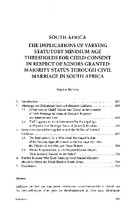The implications of varying statutory minimum age thresholds for child consent in respect of minors granted majority status through civil marriage in South Africa
| dc.contributor.author | Moosa, Najma | |
| dc.date.accessioned | 2021-06-04T09:15:35Z | |
| dc.date.available | 2021-06-04T09:15:35Z | |
| dc.date.issued | 2018 | |
| dc.identifier.citation | Najma, m. (2018).The implications of varying statutory minimum age thresholds for child consent in respect of minors granted majority status through civil marriage in South Africa. INT'l Surv. FAM. L. 493 | en_US |
| dc.identifier.isbn | 978-1-78068-663-9 | |
| dc.identifier.uri | http://hdl.handle.net/10566/6265 | |
| dc.description.abstract | South Africa is a young constitutional democracy and developing country. Its main national laws protecting children, namely, the supreme Constitution 19961 and the comprehensive Children's Act 20052 based on its provisions, are internationally acclaimed for their progressive nature. South Africa is also a state party to the main international and regional human rights instruments protecting women and children, namely, the UN Women's Convention, the CEDAW 1979;3 the UN Children's Convention, the CRC 1989;4 and the African Childrens Charter, the ACRWC 1990.' It has ratified these instruments without any reservations and therefore has a legal obligation to apply their provisions to its national laws. However, although there is a commitment in the Constitution 6 to do so, the rights contained in its Bill of Rights may also be subject to limitation. | en_US |
| dc.language.iso | en | en_US |
| dc.publisher | Intersentia | en_US |
| dc.subject | Civil marriage | en_US |
| dc.subject | Minors | en_US |
| dc.subject | South Africa | en_US |
| dc.subject | Threshold | en_US |
| dc.subject | Child consent | en_US |
| dc.title | The implications of varying statutory minimum age thresholds for child consent in respect of minors granted majority status through civil marriage in South Africa | en_US |
| dc.type | Book chapter | en_US |

